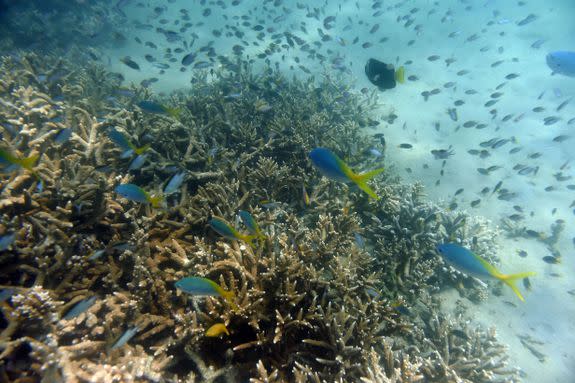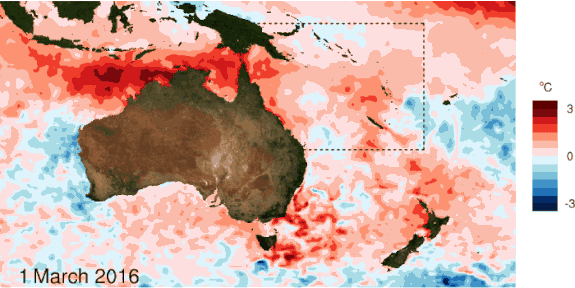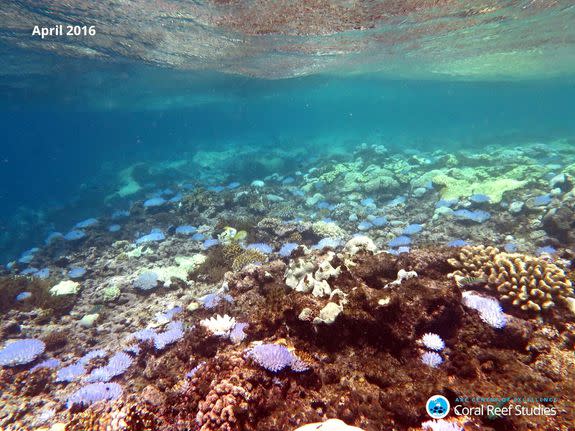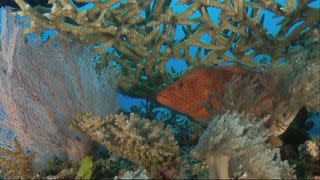The Great Barrier Reef is worth $42 billion. It's also under serious threat.


The Great Barrier Reef is an expansive wonder filled with thousands of marine species and over 600 coral types. It's naturally priceless. But think of it as a business, or prime piece of real estate, and the Australian reef is worth a hefty sum of money.
The 133,000-square-mile coral reef system represents around A$56 billion — or $42.4 billion in U.S. dollars — in economic, social, and brand value, according to Deloitte Access Economics, a consulting firm in Australia. The high dollar figure illustrates how essential the reef is to Australia's economy.
SEE ALSO: Crowdsourced coral: Scientists get creative in order to find reef 'hope spots'
That's about the same value as a dozen Sydney Opera Houses — except instead of housing artists and performers, the Great Barrier Reef shelters and sustains everything from algae, worms, and snails to fish, turtles, and sharks.

Image: Dan Peled AAP/REX/Shutterstock
And, also unlike the Opera House, the coral reef is at serious risk of disappearing.
In 2015 and 2016, the Great Barrier Reef suffered its largest die-off ever recorded due to unusually warm waters, with 35 percent of corals on the northern and central reef declared dead, the ARC Center of Excellence for Coral Reef Studies said in late May.
Scientists blamed human-caused global warming and a strong 2015 to 2016 El Niño for the hotter water temperatures, which can cause coral bleaching. In this phenomenon, corals expel their symbiotic algae and become more vulnerable to disease and death.
The world has seen the longest coral bleaching event in recorded history, which began in June 2014 and is likely only ending now, the U.S. National Oceanic and Atmospheric Administration said on June 19.

Image: mitchell black
The Deloitte report, released on Monday, frames this environmental crisis in terms that most people, and markets, can understand: money. Lose the reef, and Australia not only loses its diverse marine ecosystems — it loses potentially tens of billions of dollars and thousands of jobs in the tourism, fishing, recreation, and scientific industries.
The Great Barrier Reef Foundation, a charity conservation organization, commissioned the 90-page analysis, with support from the Great Barrier Marine Park Authority and National Australia Bank.
"With the reef under threat, our report is a major step in looking to value nature's significance in monetary terms and using this information to help inform what we do to protect and save important natural assets," John O'Mahony, the report's lead author and a partner at Deloitte Access Economics, said in a statement.

Image: Andrew Hoey
Economists estimate the Great Barrier Reef supports more than 64,000 full-time jobs — meaning that if it was an actual business, it'd employ more people than leading Australian companies such as Qantas Airways or the telecommunications firm Telstra.
The reef also added $6.4 billion to the Australian economy in 2015-2016, equal to about 0.5 percent of the country's gross domestic product in 2015, the report said.
The Great Barrier Reef's total $56 billion AUS value includes $29 billion from tourism, $3.2 billion from recreational activities, and $23.8 billion from "indirect or non-use value," a fuzzier category that includes ecosystem services, global brand recognition for Australia, and people who haven't visited the reef but "value knowing it exists."
"The reef's remarkable asset value and annual economic contribution points very strongly to the need for all of us to do all we can to protect its future — as citizens, as business leaders, and across all levels of government," Steve Sargent, director of the Great Barrier Reef Foundation, said in a statement.
WATCH: Facial recognition tech could be key to saving coral reefs


